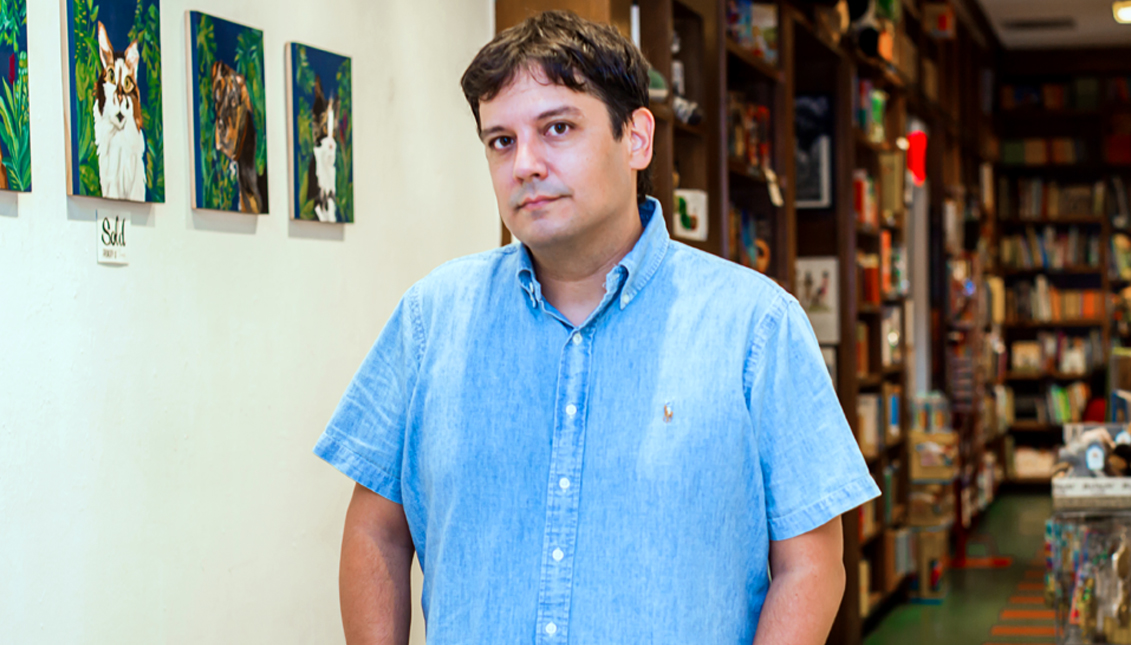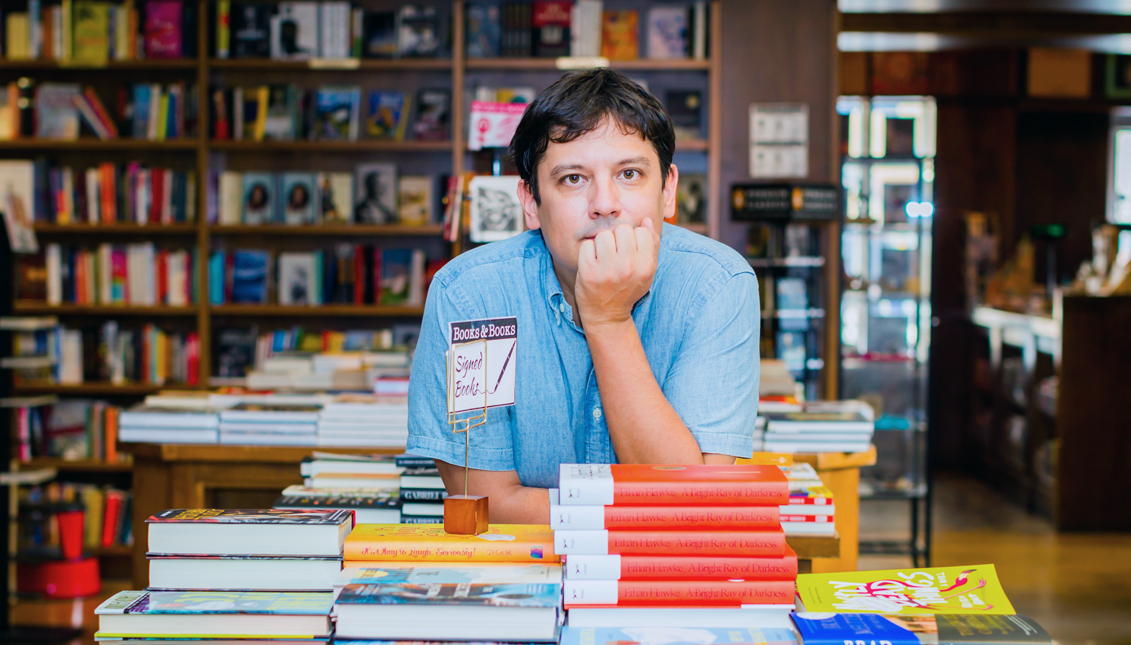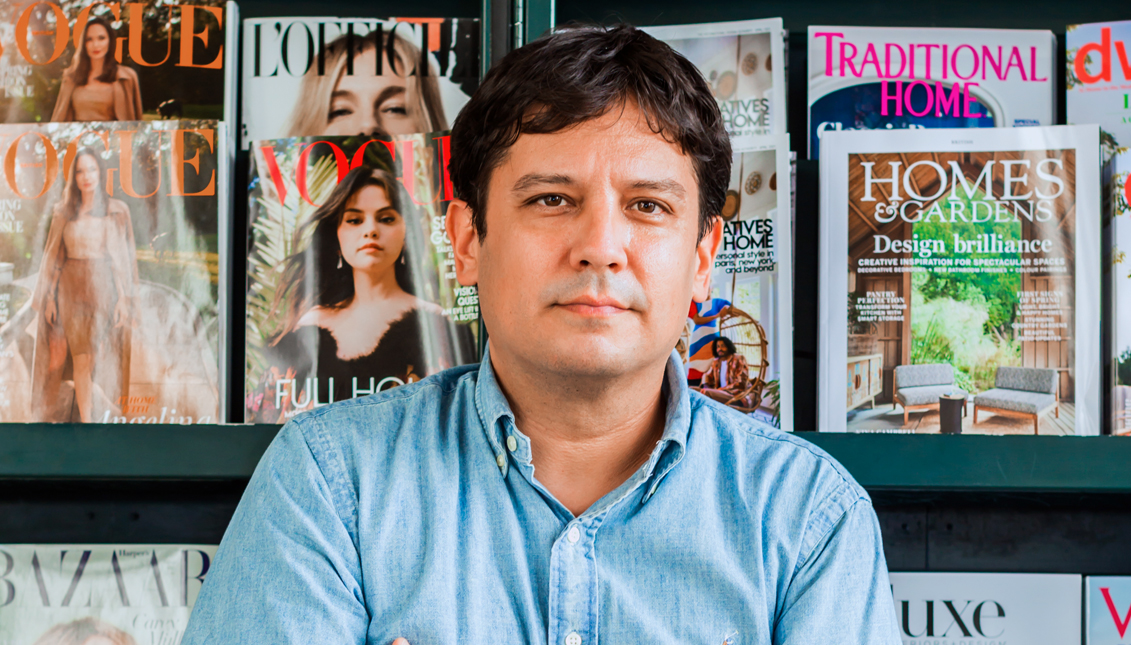
The Literary Trench of Pedro Medina León
Pedro Medina León is the first writer to publish a book of chronicles and essays about the city of Miami in Spanish.
Pedro Medina León is known as the author of Tour.
Medina León has written half a dozen novels and anthologies, edited a multitude of fiction with the label he founded some five years ago with Hernán Vera Álvarez, “comandante” Eduardo Villanueva and Gastón Virkel - “Suburbano Ediciones.”
Each new story he touches is perfumed by the memory of being the first writer to publish a book of chronicles and essays about the city of Miami in Spanish. The only one that exists.
We talked to Medina Leon about his latest novel entitled La Chica más Pop de South Beach (Sudaquia, 2020), a reflection of a “Miami genre” that, along with “Suburbano,” the author has cultivated for more than five years. The novel turns the city’s long and asphalted avenues and steady traffic into the setting for Hispanic stories that accentuate cultural contrasts and a harsh —and often violent— reality. A reality “in Spanglish,” where there are Cuban, Venezuelan, and Anglo accents, with a Peruvian touch — the author’s.
It is a “Tropical Noir’ in which Medina León moves like a fish in the water, building on the noir-criminal heritage of narratives such as Miami Vice — an 80’s cultural phenomenon where crimes took place aboard yachts and were perpetrated by criminals with heart-stopping tans — and illustrated the cultural clash between the ‘Anglo’ and the Latin American.

Born in Lima, but based in Miami for two decades, Medina Leon landed in the city at 19, with a law degree that bored him to death, and the intention of saving money and maybe moving to Spain; maybe to New York ... Under his arm, he carried a short story and the beginnings of a novel. His dream was to be a writer.
“I never said ‘I’m staying here forever,’” he says. But little by little, he ended up finding it suited him.
“I never said ‘I’m staying here forever,’” he says. But little by little, he ended up finding it suited him.
At that time, there were some cultural events in Miami, mainly from the Cuban community, which at that time was very hermetic. I created a blog to publish some chronicles, and suddenly, people began to join. And it grew and grew. Because websites are thermometers that connect you with other writers and editors who share your vision,” he said.
That was the seed of “Suburbano,” an online literary and cultural magazine with ten years of existence and a very pop approach that publishes texts in Spanish and which, over the years, was joined by a sister publishing house.
Today, “Suburbano Ediciones (SED)” is, along with “Sudaquia,” “BeiSMan,” and “Chatos Inhumanos,” one of the publishing houses that do what seemed impossible in a publishing landscape dominated by English literature: to disseminate Spanish-language literature, written in the United States, and establish links with Latin America and Europe.
In short, to somehow reverse the process of cultural assimilation that passed like a steamroller over culture and language in the history of this country.
“We were born out of the need to create a space where we could manifest ourselves,” Medina León said. “Miami is one of the most discredited regions on the planet in literary and cultural terms. There are more books in Spanish at Madrid’s Barajas Airport than in the entire United States.”
That is how Viaje One Way (2014) came about, a book that he edited with Hernán Vera and that set a precedent, being, to this day, the only anthology that brings together Miami authors who write in Spanish.
Medina León was again a pioneer with Tour: A Tour of Miami’s Popular Culture (2018), of which the second volume will be released next year and where he gathered essays and chronicles about Miami, some of them previously published in the Nuevo Herald.
“Suburbano” and Medina León were seeding the proper literary identity of Miami. And it was not an easy undertaking.
“Every city is a literary city, and this city is not. It doesn’t have established authors or a literary past, and it’s very difficult as a writer or editor to get them to look at you. But the good thing is that everything is still to be done,” he said.

While the “anglo,” as he calls them, has cultivated certain mythology of Miami and have their cultural references, this is not the case with the Hispanic side. When Even Miami is today a majority Latino city, why does this happen?
For Medina León, the reason has a lot to do with history.
“When Miami was founded, in 1896, it was mostly inhabited by the ‘Anglo,’ and then, in the 1920s’ and especially after World War II, many people began to come. Military training camps were set up, and Americans who had previously vacationed in France chose Miami as a vacation spot,” he said.
“But by the 1980s, Latin Americans took over the city, and we lived through a very dark decade in which a huge rift opened up because the ‘Anglo’ left and the Latin American stayed, and most of them were people whose priority was to eat, have a job and a visa. But not culture,” he said.
For Medina Leon, also the author of Varsovia, winner of the 2017 Florida Book Awards, those nearly 40 years since the massive waves of migrants to Miami until today are insignificant.
RELATED CONTENT
“If you ask people who have been living here for 20 or 30 years, ‘where they are from?’ they answer Dominican, or Spanish, but never from Miami. They don’t end up taking hold of the city,” he stresses.
Something paradoxical, since “the Latino owns the city. Latino power in Miami is greater than in New York or anywhere else,” he said, citing politicians, bankers, and businessmen who have money and power.
However, in recent times, and in light of a new middle and upper-middle-class Venezuelan migration that tries to replicate their lifestyle and culture, Miami is seeing a new flourishing of galleries, events, and the occasional bookstore.

University of Worcester (Massachusetts) professor and writer Naida Saavedra began to detect the new winds of change in literature written by Latinos in the United States at the beginning of the 21st century. Her research culminated in a book and a sort of movement, the “New Latino Boom,” which brings together a galaxy of resistant writers, cultural promoters, and publishers of books and magazines that write and publish entirely in Spanish in a market in which, as Pedro Medina reminds us, you can only live comfortably if you publish in English.
“This writing has a lot of passion, but it is also a profession. In the United States, you can become a professional writer in English if you have institutional support,” he said.
“This writing has a lot of passion, but it is also a profession. In the United States, you can become a professional writer in English if you have institutional support,” he said.
But doing it in Spanish is another matter altogether.
Not only is the industry a great ‘Anglo’ giant, but even today, both writers and publishers who bet on Spanish — the second most spoken language in the world — find few allies in the country to give visibility to their books.
Especially bookstores, which barely reserve a shelf for Spanish-language works — even in cities like Miami, eminently migrant and Latino. And sometimes, not even that.
And when they do, the books that fill the shelves are works by García Márquez, Vargas Llosa, or Ricky Martin biographies, Pedro Medina said.
“Amazon is the main ally of independent publishers like ours because here (the United States) is not like Buenos Aires or Barcelona; there are no bookstores. Recently they closed Strand, in New York, a bookstore that I loved, but when we tried to enter, they didn’t even pay attention to us,” he confessed. “A publishing house is a business, and ours, like many, was born out of necessity, but we had to build the building starting from the roof instead of the foundations.”
The search for a business model continues to be the main driver for publishers like “Suburbano,” who sense, but cannot yet put a face to their readership:
“There are many business aspects that are not studied or clear, and it is our duty as publishers to define and understand,” he admitted. He said that, although as of today there is no publishing model for books in Spanish that is sustainable, creating links with Latin America is the challenge for this year.
That is why “Suburbano” recently inaugurated the first edition of its SED Novel Prize, whose winner was Flores de la Calle, by Argentine writer Marina Condó, as well as the collection Outsiders that publishes authors from all over the world, and who’s next release, in May 2021, will be Electrónica, by Enzo Maqueira.
“Suburbano” also hopes to launch a series of dialogues or “cross-talks” to create ties between writers and publishers from Latin America, Europe, and the United States.











LEAVE A COMMENT:
Join the discussion! Leave a comment.